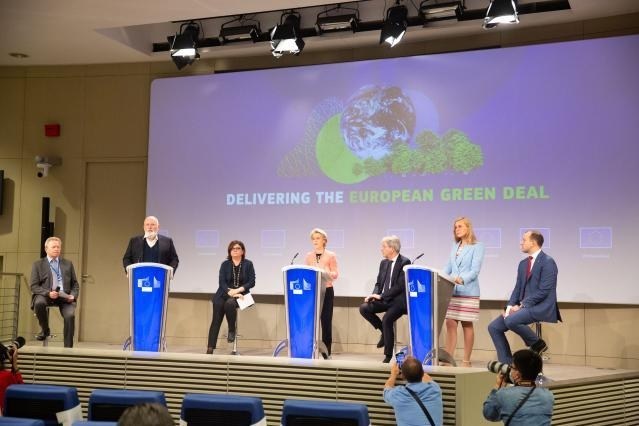The European Commission adopted a package of proposals on Wednesday to make the EU's climate, energy, land use, transport and taxation policies fit for reducing net greenhouse gas emissions by at least 55% by 2030, compared to 1990 levels.
The Commission describes the “Fit for 55” – package as a comprehensive and interconnected set of proposals that will enable the necessary acceleration of greenhouse gas emission reductions in the next decade. The package includes a long list of measures with focus on economic costs and incentives and was overall well-received by the European Parliament.
Among others, the EU Emissions Trading System will be tightened and applied to new sectors. New measures will be introduced for increased use of renewable energy, greater energy efficiency, faster roll-out of low emission transport modes and the infrastructure and fuels to support them, alignment of taxation policies as well as measures to prevent carbon leakage and tools to preserve and grow our natural carbon sinks.
“This is the make-or-break decade in the fight against the climate and biodiversity crises,” said Frans Timmermans, Executive Vice-President for the European Green Deal. “The EU has set ambitious targets and today we present how we can meet them. Getting to a green and healthy future for all will require considerable effort in every sector and every Member State.”
He added that Europe's transition will be fair, green and competitive, referring to a new Carbon Border Adjustment Mechanism to put a carbon price on imports of a targeted selection of products and a new Social Climate Fund to provide dedicated funding to Member States to help citizens finance investments in energy efficiency, new heating and cooling systems, and cleaner mobility.
Quoting Hamlet at the press conference with Commission President von der Leyen and a line-up of Commissioners in the concerned sectors and industries, he said that, “The time is out of joint” and that we have a responsibility to ensure the future of the planet for our children and grandchildren. Humanity has to learn to live within the planetary boundaries.

Commissioners Janusz Wojciechowski, Frans Timmermans, Adina Vălean, President Ursula von der Leyen, Commissioners Paolo Gentiloni, Kadri Simson, Virginijus Sinkevičius presenting the Fit for 55 package, credit: EU
An issue which was not included in the package but which has gained traction in this context is to amend the statutes of the International Criminal Court and include ecocide alongside other international crimes such as war crimes, crimes against humanity and genocide. Such legislation would send a strong signal to protect the planet and the environment in the widest sense of the word.
A concrete proposal for a definition of ecocide was recently presented by an international group of legal experts, including law professor Philippe Sands. In the proposal, “ecocide” is defined as unlawful or wanton acts committed with knowledge that there is a substantial likelihood of severe and either widespread or long-term damage to the environment being caused by those acts.
Asked by The Brussels Times if the Commission intends to initiate legislation on ecocide, Timmermans replied that he did not reject the idea out of hand but thought that time was not yet ripe. He listed a number of reasons for the Commission’s position such as public opinion, alternative measures and the divide in competencies between the EU and its member states.
First of all, it is a competency in the hands of the member states, he said. What the Commission can do is to put a premium on the right behaviour and a cost on the wrong behaviour. “I think that this is something we need to work on by giving positive incentives rather than using penal law.”
He added that serious misbehaviour leading to degradation of the environment in the member states is already subject to penal law but did not exclude that ecocide might also become a criminal law issue. Referring to the forest strategy in the package, he claimed that a clear step has been taken to avoid ecocide and preserve biodiversity.
“There is a global sense of urgency about climate change, especially in Europe,” Vice-President Timmermans underlined, “but not yet as regards ecocide. “My prediction is that our citizens in 2 – 3 years will have the same sense of urgency about ecocide as we already have about the climate crisis.”
In fact, ecocide is accelerating climate change, as is happening when the rain forests in the Amazon are decimated by wildfires and deforestation or multinational companies, including European ones, are polluting the environment with impunity, without any national jurisdiction to hold them accountable.
Time is already out of joint. The most recent decade, 2011 – 2020, was the warmest on record, according to the International Panel on Climate Change, causing dangerous climate phenomena and extreme weather changes such as flooding and heat waves.
The proposal for legislation on ecocide is supported by number of MEPs across the major political groups in the European Parliament.
"I regret that Mr Timmermans does not see the urgency of recognizing ecocide,” commented MEP Marie Toussaint (Greens/EFA). “The international mobilization is growing today, not tomorrow, and more and more countries and parliamentarians call for the recognition of ecocide both on national and international level.”
“We now have a high-level proposal for a definition of this new crime, which can serve as a basis for EU law. But most of all, climate change and the destruction of ecosystems are on-going and even accelerating. We must urgently equip ourselves with laws that allow us to condemn, to prevent and to prosecute the gravest crime against the safety of the planet."
M. Apelblat
The Brussels Times
